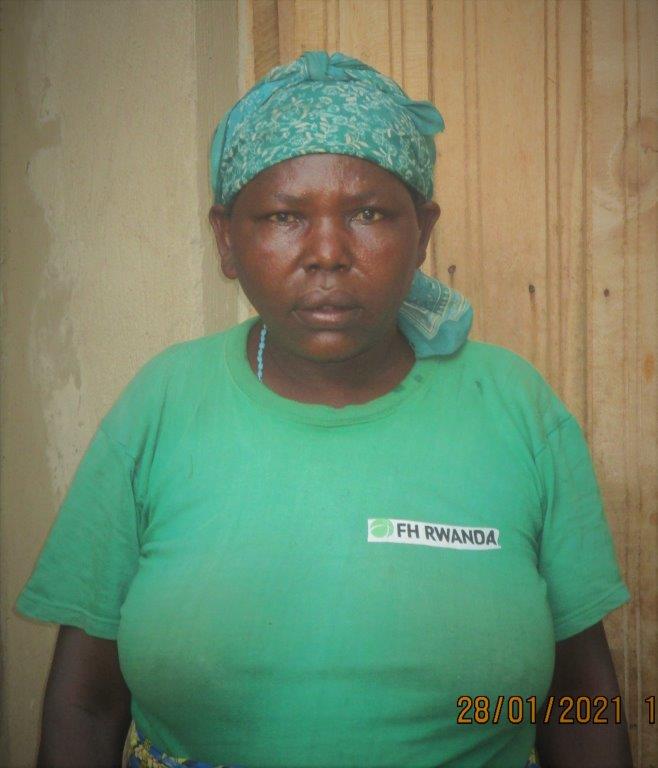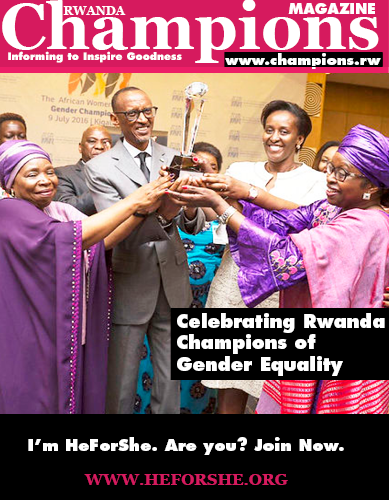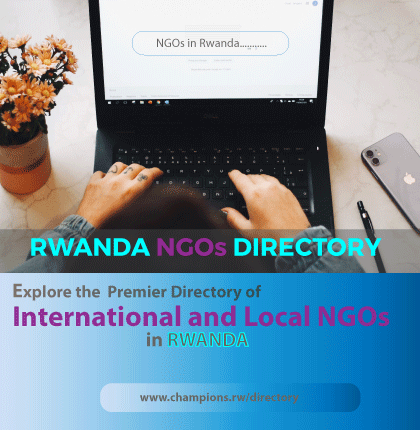UN Women Rwanda launches $6.3 million plan to boost women’s empowerment
UN Women Rwanda has launched a new four-year strategic plan that will require about $6.3 million to expand programs (…)
BY FH Association Rwanda
FH Association Rwanda (FH Rwanda) began its work in Rwanda as a relief response to the poverty and human suffering caused by the genocide against the Tutsi in 1994. Over the years, FH Rwanda’s work evolved from an emergency response to a reconstruction and development program as the country gradually returned to stability. Currently, FH Rwanda is putting efforts on long-term development interventions in livelihoods, education, health and Disaster Risk Reduction (DRR).
Currently, FH Rwanda is operating in five districts across the country. For the last two decades, the organization has been implementing projects that have helped to improve the livelihoods of poor families, with focus to community empowerment whereby community members become the agents of their own positive change and drive their development through active participation.
In Nyagatare District, FH Rwanda has been supporting 15 women and teen mothers in Kabeza Cell of Gatunda Sector. FH Rwanda has been supporting Kabeza Women Group also known as Korawigire, which was formed in 2017, and this group was primarily focused on making handcrafts.
Kabeza Women Group engaged in making handcrafts. They were working under the trees before getting a business premise/workshop. Photo by FH Rwanda.
In June 2020, FH supported the group with 9 sewing machines, 100kg of beads for making handbags, bracelets, and shoes made out of Kitenge fabric. The group also received 12 pieces of Kitenge fabric, knitting threads, and 20 rolls of foam used as a raw material for making handbags, school bags and other materials tailored in Kitenge fabric.
The group has now increased the handcraft products, expanded their tailoring project by buying four more sewing machines and each woman/member earns an income from sewing clothes. The group is able to pay rent for a workshop where the members meet to make the handcrafts, keep the sewing machines and store the finished products. The group opened a bank account and each member saves Rwf 200 every week through the group, which is deposited in their bank account.
Through this support, women have increased their income, are providing for their families and have a positive mindset, which has helped them to boost their self-esteem in transformation journey.
Kabeza Women Group in their tailoring workshop. Photo by FH Rwanda.
NYAGATARE WOMEN BENEFICIARIES SPEAK OUT
NYANZIRA Joselyne
Nyanzira Joselyne. Photo by FH Rwanda
NYANZIRA Joselyne, 32, is married with 2 children. Her family lives in Kabeza Cell, Gatunda Sector in Nyagatare District, Eastern Province. She is a member of Kabeza Women group supported by FH Rwanda to increase their income.
Before joining the group, her family lived a challenging life in a shaky house, and could not afford medical insurance, school fees for children and Nyanzira had no way to participate in a saving group. For the family to eat, Nyanzira and her husband could do casual work for others to raise money to buy food.
When Nyanzira joined the group, she was given life-changing support which she uses to generate income and to contribute to the family welfare. With support from FH Rwanda which included sewing machines and beads to make women handbags, members of the group including Nyanzira were trained in tailoring and soon after, they started getting business and making money.
Using the group’s sewing machines, Nyanzira worked hard and her income increased. She could sew clothes, make hand bags for women using beads and sell them. Within two months, Nyanzira had bought herself two sewing machines which she stationed at her house, something that increased her capacity to make more handbags and to tailor more clothes.
Nyanzira Joselyne with her two sewing machines. Photo by FH Rwanda.
Fortunately, her income continued to grow and she started even making savings. From what she was earning, together with her husband, they upgraded their house, and their family’s living conditions improved significantly.
They bought a piece of land where they grow their own food and they have the ability to pay medical insurance and fees for their children. Nyanzira even created employment for her neighbor through her tailoring business.
NYIRAHABYARIMANA Victoire
Nyirahabyarimana Victoire. Photo by FH Rwanda.
Nyirahabyarimana Victoire is 41 years old. She is married with 3 children. Her family lives in Kabeza Cell, Gatunda Sector, Nyagatare District in Eastern Province. She is also a member of Kabeza Women Group supported by FH Rwanda.
Before joining the group, Nyirahabyarimana’s family was among the poorest in Gatunda Sector despite having a small piece of land, whose harvest was not enough to feed the entire family. The family lived in severe conditions, often eating once a day due to lack of enough food. They did not know anything about a balanced diet and they suffered from poor hygiene, while children were not going to school due to lack of materials and fees and Nyirahabyarimana was often in quarrels with her husband.
“All of these problems affected my family especially my children where they had no means to go to school and they would often go with me to do casual jobs for us to survive,” says Nyirahabyarimana.
“My children were frequently falling sick due to poor hygiene and I could not take them to the health center for treatment because I had no medical insurance. Things were always worse for me and for my family,” Nyirahabyarimana further said.
When Nyirahabyarimana joined the group, life started changing. With support from FH Rwanda, she got a sewing machine and beads to make handbags. She started learning tailoring and soon she mastered the skill. She immediately started sewing clothes and making handbags for sell. She started earning income and used part of it to buy two goats and rent a piece of land with 15 by 300 meters where she started growing Irish potatoes. With her initial investment of Rwf 25,000 in the Irish potatoes, she got a return of Rwf 250,000 after the harvest.
Currently, her goal is to double the land she rents to increase production of Irish potatoes and to buy her own land. She plans to use the land for growing vegetables and to use the fertilizer from her two goats to boost the vegetables’ produce.
GATSIBO WOMEN BENEFICIARIES SPEAK OUT
MUSABYIMANA Josephine

Musabyimana Josephine. Photo by FH Rwanda.
Musabyimana Josephine, 54 years old lives in Nyagitabire Cell, Nyagihanga Sector in Gatsibo district. She is a widow and lives with her 27-year-old son, a university student at the Integrated Polytechnic Regional Center(IPRC-North) in Rulindo District, Northern Province.
Musabyimana is a member of Ababerarugo Cooperative, one of the seven cooperatives supported by FH Rwanda in Nyagihanga Sector.
Before working with FH Rwanda, the cooperative was facing a number of challenges including lack of knowledge and skills in modern agricultural techniques, limiting its abilities to grow financially and impact the lives of its members.
The cooperative is composed of 53 women who combine maize and mushroom farming. FH Rwanda supported the cooperative with planting materials/seeds and agricultural equipment such as storage cocoons, four water pumps and wheelbarrows for transporting inputs and produce. The cooperative also received three cows as the source of milk and manure for its members and adopted a rotation of calves among the members.
When Musabyimana joined Ababerarugo Cooperative, she saw a ray of hope. She was trained on modern farming techniques, savings culture, cooperative formation and management, and behavior change through dialogues.
Before joining the cooperative, Musabyimana faced difficulties. As a widow and the head of household, she was a smallholder farmer relying on traditional farming techniques with very low yields. Musabyimana struggled to get essential family needs such as food, water and even contribution for medical insurance.
In farming, she would grow more than two crops in the same garden without following any guidelines thus leading to very low yields.
“My harvest was always low due to the use of traditional farming techniques despite consistent efforts and energy. The little I would harvest was always for home consumption and sometimes, I would sell some of it to buy other essential items needed at home,” Musabyimana says.
Selling some of her yields would lead to severe shortage of food. “My son and I used to have one meal in a day because our harvest was not enough due to lack of knowledge and relying on traditional farming practices,” Musabyimana says.
“Through our cooperative, we have been trained in different skills that are essential in our daily life and it has improved our lives as well as our mindset towards the development we need,” adds Musabyimana.
With increased income, she says she is able to get basic needs for her family including contribution for medical insurance and she can afford her favorite food.
She is also able to provide school materials and other basic needs for her son.
Through the cooperative, Musabyimana got a loan of Rwf 200,000 from Umurenge SACCO and built a new house of 8 iron sheets, giving herself and her son a spacious house. The house is valued at about Rwf 400,000.
Musabyimana Josephine in front of her new house constructed with a loan from Umurenge SACCO with the support of the Ababerarugo Cooperative. Photo by FH Rwanda.
The support from FH Rwanda has helped Musabyimana to curve a path to a better life: “My neighbors have changed their attitudes towards me. They used to underestimate my abilities but it is no longer the case. I now have many friends from the cooperative. Thanks to FH Rwanda for the support towards my success.”
UWAMBAYIMANZI Marie Odette
Uwambayimanzi Marie Odette. Photo by FH Rwanda.
Uwambayimanzi is another member of the Ababerarugo Cooperative. The 48 year-old is married and together with her husband, they have four grown-up children with the youngest being 19 years old. They live in Mayange Cell, Nyagihanga Sector in Gatsibo District. They are farmers.
Before joining the cooperative, the family of Uwambayimanzi could not get enough to eat and surplus to sell to pay for other essential needs such as clothes, medical insurance and school materials for children. This was due to reliance on traditional farming practices with low yields.
After joining the cooperative, Uwambayimanzi has benefited from trainings organized by FH Rwanda on modern farming Techniques such as modern banana farming, smart agriculture practices like mulching, crop rotation, making compost manure, intercropping and the importance of agroforestry trees.
“All of these trainings equipped me with skills to improve my farming practices in order to increase agricultural production,” Uwambayimanzi said, adding that she was also trained on savings culture, cooperative formation and behavior change through group dialogues.
Supported by the cooperative, she received a loan of Rwf 75,000 from Umurenge SACCO to inject in her business. She uses part of the profit she gets from her venture to pay for medical insurance, and cater for the family needs.
From her profits, she bought a pig which is not only a future source of income but she also uses its waste as manure for her crops to boost production. She also bought a bicycle of Rwf 40,000 to facilitate transport needs for her daily commercial activities.
Uwambayimanzi with her bicycle she bought to facilitate transport needs for her commercial activities. Photo by FH Rwanda.
Uwambayimanzi says that the training on modern farming techniques boosted her farming practices and increased agricultural production and her mindset has changed towards self-reliance as a result of behavior change dialogues.
Together with her husband, they now have financial freedom to buy school materials like uniforms and others for their young children (one in Senior 3 and another one in nursery school), and they eat a balanced diet.
In her own words, she said: “I got new friends from our cooperative and others from different cooperatives we met during the trainings. Thanks to Food for the Hungry that paved the way for us to live a wealthy and healthy life.”
UN Women Rwanda has launched a new four-year strategic plan that will require about $6.3 million to expand programs (…)
UN Women Rwanda has launched a new four-year strategic plan that will require about $6.3 million to expand programs (…)
African women leaders are calling for greater solidarity and collaboration to help more women attain leadership (…)
Women for Women International (WfWI) has appointed Nigerian development expert Thelma Ekiyor as its new global chief (…)

